Thematic analysis and practical advice
In focus
-
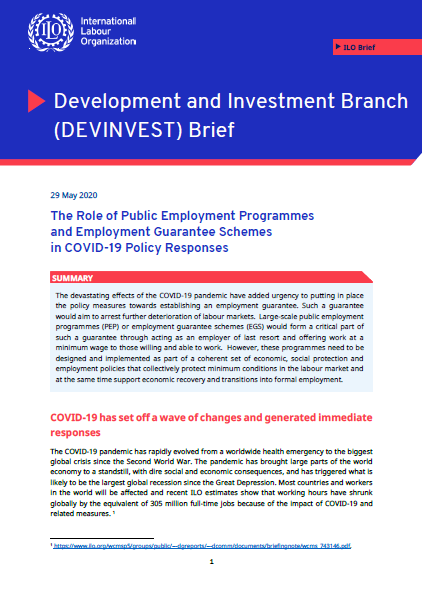
The role of public employment programmes and employment guarantee schemes in COVID-19 policy responses
29 May 2020
-

Preventing exclusion from the labour market: Tackling the COVID-19 youth employment crisis
27 May 2020
-

The COVID-19 response: Getting gender equality right for a better future for women at work
22 May 2020
Despite COVID-19, many women in the informal economy have continued to work, putting their health in peril, while many other women are employed in sectors at high risk of job losses or reduction in working hours. Getting gender equality right in the COVID-19 response is key to ensure the return to a better normal.
-
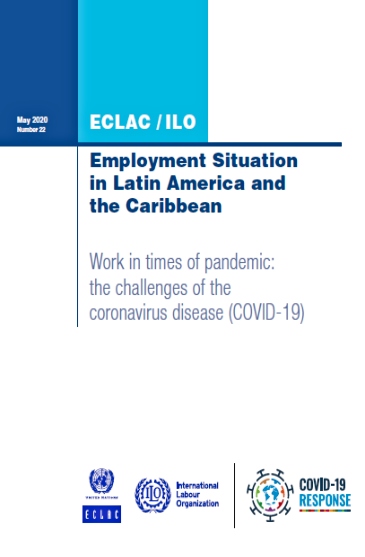
Employment Situation in Latin America and the Caribbean (Number 22): The challenges of the coronavirus disease (COVID-19)
21 May 2020
ECLAC and the ILO presented a new joint publication in which they analyze labour challenges in the wake of the pandemic. The organizations indicate that the crisis will likely cause 11.5 million more people to be unemployed in Latin America and the Caribbean.
-
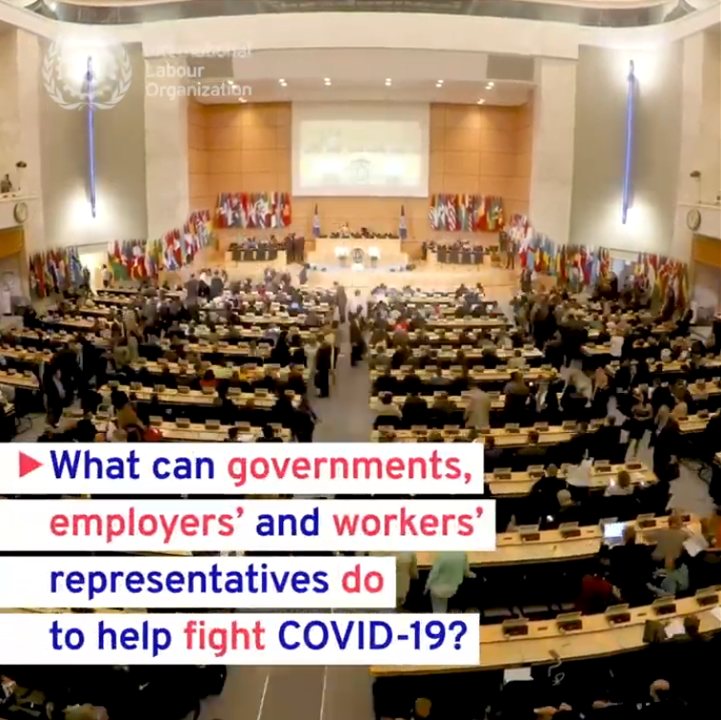
Social dialogue key to combating COVID-19
21 May 2020
What can governments, employers and workers do to help fight Covid-19? They can work together. The ILO calls this cooperation between representatives of governments, employers’ and workers’ organizations social dialogue.
-
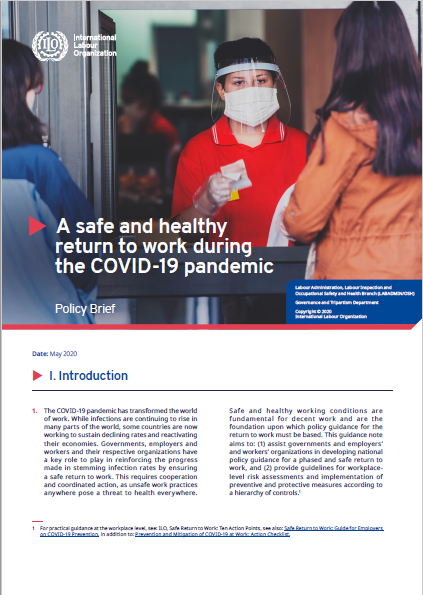
A safe and healthy return to work during the COVID-19 pandemic
21 May 2020
This guidance note aims to assist governments and employers’ and workers’ organizations in developing national policy guidance for a phased and safe return to work, and provide guidelines for workplace-level risk assessments and implementation of preventive and protective measures according to a hierarchy of controls.
-
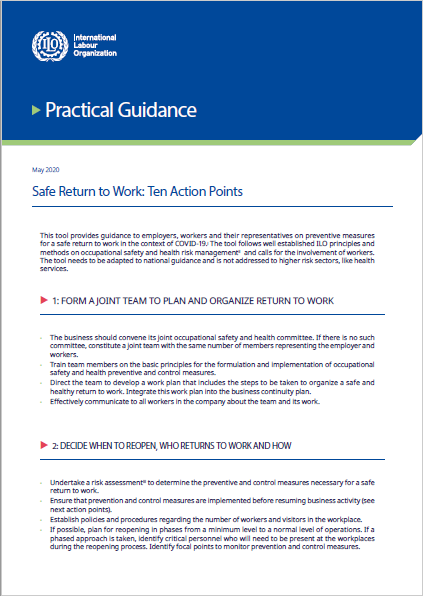
Safe Return to Work: Ten Action Points
21 May 2020
This tool provides guidance to employers, workers and their representatives on preventive measures for a safe return to work in the context of COVID-19, conforming to well established ILO principles and methods on occupational safety and health risk management.
-
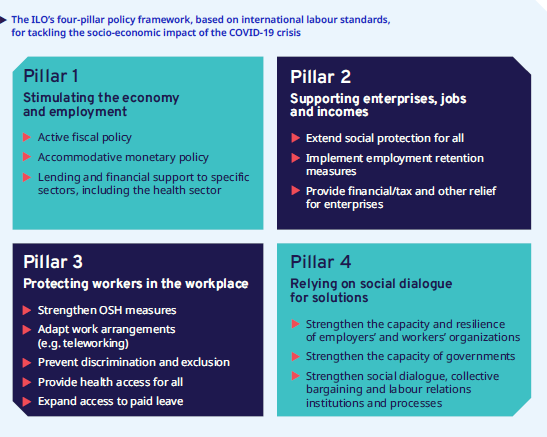
ILO policy framework for tackling the economic and social impact of the COVID-19 crisis
20 May 2020
The ILO has structured its key policy messages around four pillars. Each pillar complements the others in response to the unprecedented crisis faced by all countries. International labour standards provide a tried-and-trusted blueprint for policy responses designed to facilitate a recovery that is inclusive, sustainable and resilient. These standards make up the pedestal on which the four pillars rest.
-
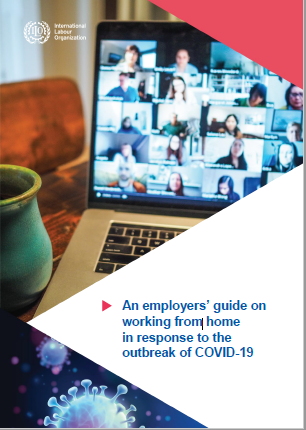
An employers’ guide on working from home in response to the outbreak of COVID-19
18 May 2020
This guide has been developed by the International Labour Organization Bureau for Employers’ Activities (ILO-ACT/EMP) to assist EBMOs to provide practical guidance to member companies that have implemented “working from home” protocols for their staff in 2020 as an alternative temporary arrangement during the COVID-19 crisis.
-
Development and investment for a sustainable response to COVID-19
15 May 2020
-
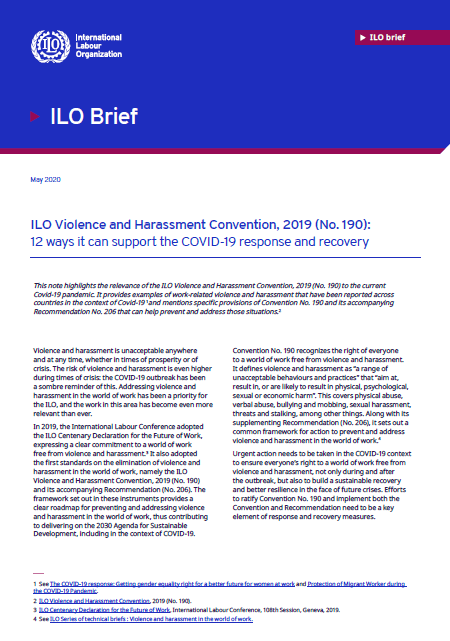
ILO Violence and Harassment Convention, 2019 (No. 190): 12 ways it can support the COVID-19 response and recovery
14 May 2020
This note highlights the relevance of the ILO Violence and Harassment Convention, 2019 (No. 190) to the current COVID-19 pandemic. It provides examples of work-related violence and harassment that have been reported across countries in the context of COVID-19 and mentions specific provisions of Convention No. 190 and its accompanying Recommendation No. 206 that can help prevent and address those situations.
-
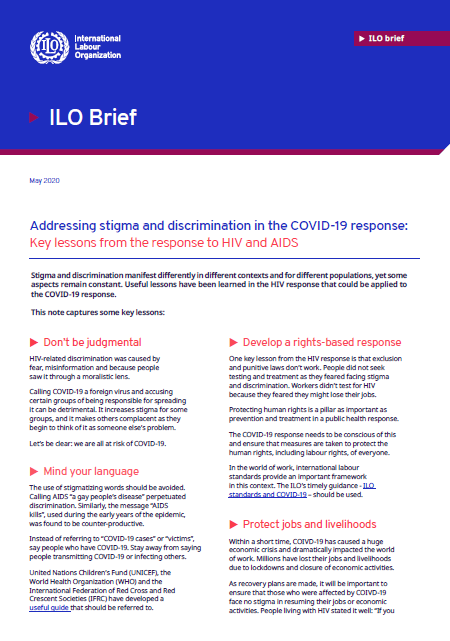
Addressing stigma and discrimination in the COVID-19 response: Key lessons from the response to HIV and AIDS
14 May 2020
Stigma and discrimination manifest differently in different contexts and for different populations, yet some aspects remain constant. Useful lessons have been learned in the HIV response that could be applied to the COVID-19 response.
-
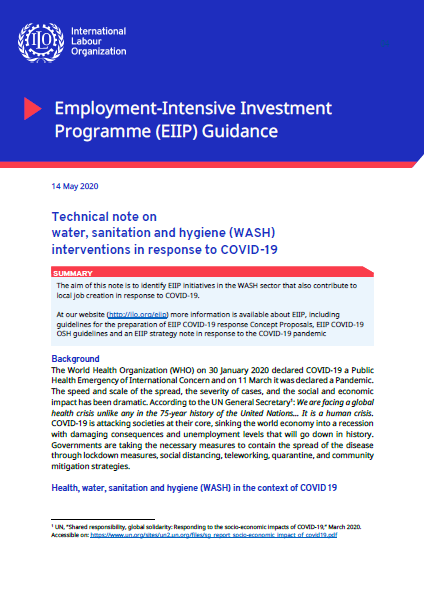
Technical note on water, sanitation and health (WASH) interventions in response to COVID-19
14 May 2020
The aim of this note is to identify EIIP initiatives in the WASH sector that also contribute to local job creation in response to COVID-19.
-

The impact of COVID-19 on the informal economy
08 May 2020
Almost 1.6 billion informal economy workers are significantly impacted by the COVID-19 pandemic, leading to a 60 per cent decline in their earnings. For those workers, stopping work or working remotely at home is not an option. Staying home means losing their jobs and, for many, it also means losing their livelihoods.
-
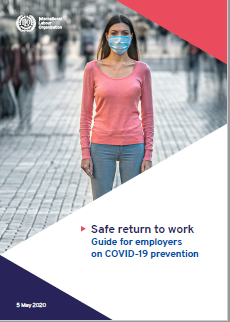
Safe return to work: Guide for employers on COVID-19 prevention
07 May 2020
This Guide has been developed by the ILO Bureau for Employers’ Activities (ILO-ACT/EMP) and contains recommendations for health and safety practices and approaches to COVID-19 prevention.The publication aims to provide general guidance and information to employers on how to prevent the spread of COVID-19 in the workplace, to enable workers to return to work safely while keeping the risk of contamination as low as possible. It also provides ideas on how to protect workers’ mental well-being during the pandemic.
-
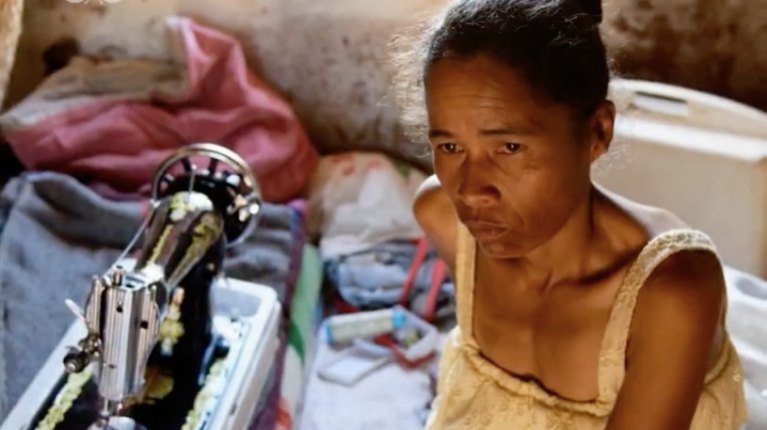
COVID-19 and the informal economy in Africa
07 May 2020
The COVID-19 pandemic has had a devastating effect in Africa, particularly in the informal economy where 325 million workers make their living. Lockdown measures have significantly impacted their lives, along with the many informal enterprises that are at risk of closure.
-
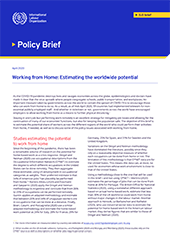
Working from Home: Estimating the worldwide potential
07 May 2020
Staying in one’s job but performing work remotely is an excellent strategy for mitigating job losses and allowing for the continuation of many of our economies’ functions, but also for keeping the population safe. The objective of this brief is to estimate the potential share of workers across the different regions of the world who could perform their activities from home, if needed, as well as to discuss some of the policy issues associated with working from home.
-
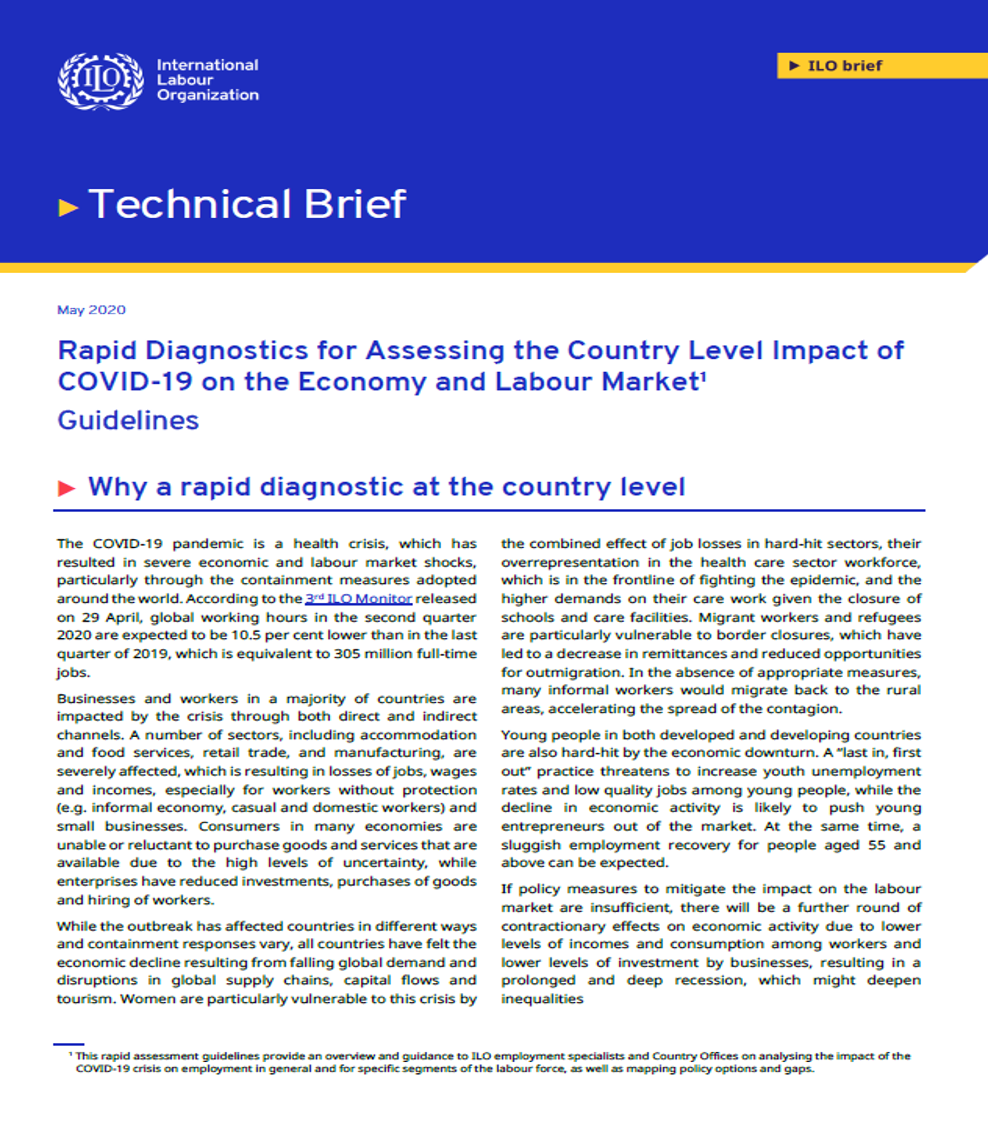
Rapid Diagnostics for Assessing the Country Level Impact of COVID-19 on the Economy and Labour Market - Guidelines
05 May 2020
These guidelines were developed by the ILO's Employment, Labour Markets and Youth Branch (EMPLAB) to support countries, through ILO employment specialists and Country Offices, undertake rapid diagnostics to assess the impact of the COVID-19 crisis and policy responses.
-
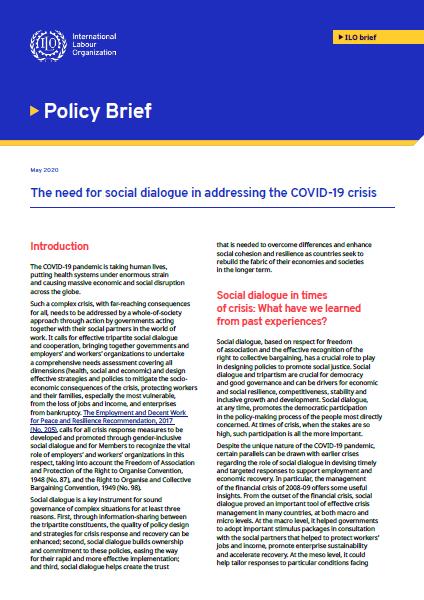
The need for social dialogue in addressing the COVID-19 crisis
05 May 2020
The COVID-19 pandemic with its far reaching socio-economic consequences calls for effective tripartite social dialogue and cooperation bringing together governments and employers’ and workers’ organizations to design effective strategies and policies to address its impacts.
-
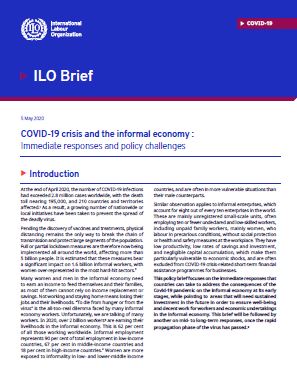
COVID-19 crisis and the informal economy: Immediate responses and policy challenges
05 May 2020
This policy brief focuses on the immediate responses that countries can take to address the consequences of the Covid-19 pandemic on the informal economy at its early stages, while pointing to areas that will need sustained investment in the future in order to ensure well-being and decent work for workers and economic undertakings in the informal economy. This brief will be followed by another on mid- to long-term responses, once the rapid propagation phase of the virus has passed.